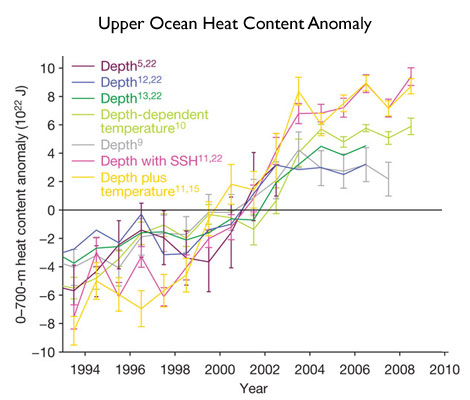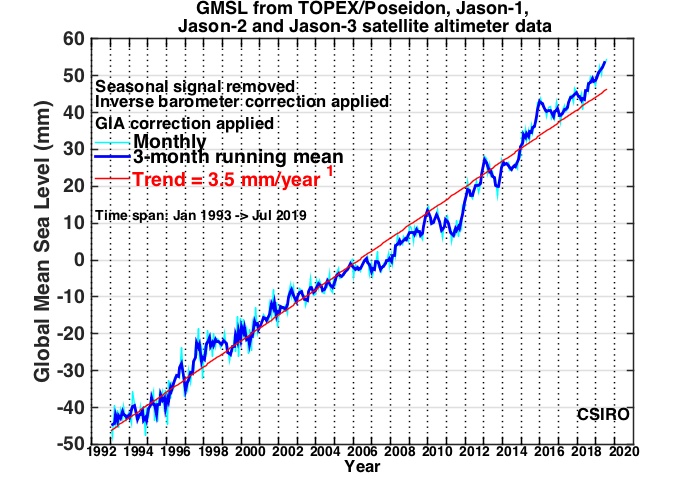Pielke Sr and scientific equivocation: don't beat around the bush, Roger
Posted on 8 September 2010 by gpwayne
When I wrote a ‘basic’ rebuttal on ocean heat, I didn’t expect one of the world’s foremost climate scientists - and one who is frequently associated with climate change scepticism - to take issue with me, or to take it so personally. But he did, and he chose to do so on his own blog, with comments turned off so I couldn’t respond or defend my work. Since Dr. Pielke didn’t care to pop in to Skeptical Science and talk to us, I’ll just have to consider his arguments, and my responses to them, in this post instead.
Setting the scene
Let’s start by considering the skeptical arguments I was rebutting. We employed a statement by Pielke Sr as a stand-in for a broader issue – that global warming has stalled or stopped during the last decade because the oceans have not continued to heat up. As far as oceans are concerned, the broad assertion made by many skeptics depends on a rather odd assumption – that temperature changes in the ocean or atmosphere will be linear – steady, regular rises that march in step with GHG increases. Unfortunately, we’re talking about a chaotic system, so nothing is likely to be quite so tidy. But that isn’t Pielke’s specific argument; in this case, his is a subset of this wider misinterpretation of climate science and the evidence for it.
What then are his specific arguments? There are two; the first is that the oceans have not been accumulating heat since 2004. The second is, and I quote “Global warming, as diagnosed by upper ocean heat content has not been occurring since 2004”.
Does Pielke Sr still think this? Apparently so, because in his indignant response, this is what he wrote about my rebuttal:
“The author of this post [that’s me] documents in the figures that they present, that upper ocean heat, in terms of its annual average, did not accumulate during the period ~2004 through 2009. This means that global warming halted on this time period. There is no other way to spin this data”.
The emboldening is Pielke’s, not mine. (I might also suggest he refrains from suggesting he couldn’t think of any other way to “spin this data”. He was probably being ironic, right? Let’s hope so).
Have the oceans been cooling?
It stands to reason that if the oceans haven’t been cooling, the wheels come off Pielke’s argument pretty quickly. So what does the science say? To examine the evidence, I used Lyman 2010, which created a meta-study of various measurements for the last two decades. This choice eliminated one key problem with Pielke’s assertion – dependence on too small a data sample. It also gave us a clearer indication of overall trends, because as usual it is necessary to screen out noisy signals to ascertain the valid long-term trend. What Lyman 2010 shows very clearly is that although upper ocean heat increases are irregular, the trend is very clear:

Source: Lyman 2010
But I’m just a journalist writing about science. Perhaps we should look to someone who has hands-on expertise in the field, someone like Kevin Trenberth, who also takes issue with Pielke’s claims about ocean heat:
Trenberth, April 2010: We are well aware that there are well over a dozen estimates of ocean heat content and they are all different yet based on the same data. There are clearly problems in the analysis phase and I don’t believe any are correct. There is a nice analysis of ocean heat content down to 2000m by von Schuckmann [Global hydrographic variability patterns during 2003–2008] but even those estimates are likely conservative. The deep ocean is not well monitored and nor is theArctic below sea ice... [An article going to press] highlights the discrepancies that should be resolved with better data and analysis, and improved observations must play a key role.
So what does Pielke think about these discrepancies in ocean heat content? This is part of his response to Trenberth:
Pielke: We both agree on the need for further data and better analyses...However, I do not see how such large amounts of heat could have transited to depths below 700m since 2005 without being detected.
Source (both quotes): Post on Pielke’s blog
Now call me picky if you like, but if there’s a lot of discussion about the accuracy of the data, the methods of analysing it, and what it all means, then surely it would be more prudent to make clear the uncertainty, and certainly make clear the arbitrary nature of one’s scepticism e.g. “I do not see how such large amounts...” Incredulity is not science. Yet there’s very little uncertainty in Pielke’s claim that “global warming halted on this time period”, which appears to be based on arbitrary assumptions, especially when you look at Von Schuckmann’s paper. This is the graph of ocean heat content down to 2000 metres:

Figure 11: Time series of global mean heat storage (0-2000m).
This is what the von Schuckmann paper had to say about the graph: Figure 11a shows the variability of globally averaged deep ocean heat content computed from the monthly temperature anomaly fields. A considerable warming is visible from the year 2003 to 2008. The 6-year heat increase implies an average warming rate of 0.77 ± 0.11Wm2. Much of this increase in heat storage comes from the
Compare that statement to this one, from Pielke’s post:
“What the Skeptical Science fails to recognize is that with respect to the diagnosis of global warming using Joules of heat accumulation in the oceans, snapshots of heat content at different times are all that is needed. There is no time lag in heating or cooling. The Joules are either there or they are not. The assessment of a long-term linear trend is not needed”.
Sorry, but if you take ‘snapshots’ (isn’t that another name for cherry-picking?) and come to a conclusion at odds with the trend demonstrated by the full data, perhaps the snapshot technique isn’t very suitable? The statement about ‘no time-lag’ is puzzling, since latency is a big issue in ocean studies. Heat moves around the ocean in mysterious ways, and as Trenberth notes there are considerable areas of uncertainty in deep water measurements, Arctic heat content and the analysis techniques themselves. Since Pielke appears to agree, it is hard to understand how he can defend his claims, based as they are on certainties that the data don’t support.
So, on the science, it appears that in the first place, the premise that the oceans have not been heating may not be correct, and the science certainly isn’t settled. Pielke Sr may simply be wrong, he most certainly cannot provide definitive, unequivocal evidence to support his claim, and statements investing so much inappropriate certainty on something so uncertain are not worthy of a reputable scientist.
Pielke Sr claims I have misrepresented the science. It seems to me the boot is on the other foot, and it isn’t just me:
“I had noted that Pielke Sr. loves to cherry-pick climate data over short time spans to make misleading scientific claims about climate. Climate, of course, is about long-term trends”.
And for completeness, Realclimate respond on several issues following an attack on them by Pielke. Read it and decide for yourself if there isn’t a bit of a pattern emerging here.
Did Global Warming stop during this period?
So far I’ve dealt with uncertainty, our requirement to acknowledge it, and the inadvisable nature of making assumptions based on short term data. There is much more to all this, as you can read at Realclimate and Pielke’s blog, where ocean heat arguments come up regularly. To this journalist, they seem rather circular; what I do take from all this is that nobody really know that much for certain. Including Pielke.
When we turn to the other issue I believe is important, things seem a little clearer, because there is a pervasive logic that must surely apply. It is this statement that troubles me:
“This means that global warming halted on this time period”.
It cannot be controversial to suggest that if you are considering whether a phenomenon is taking place or not, one would evaluate all the manifestations of that phenomenon. Ocean heating –whatever the hell is going on down there – is only one part of the jigsaw. Let’s just assume for a moment that the oceans did not heat up for five years. In order to assert that global warming has halted in this period, we would also expect to see no negative mass balance in the Arctic or
Another response we would expect to see in the data would be sea level rise. It is curious to note that Pielke also disputes this area of study in much the same fashion; according to him, reports that sea levels are rising at an accelerating rate are simply ‘not true’.
So according to Pielke, for five years oceans did not heat up, ice did not melt and sea levels did not increase. This is too much research for one man to debunk. It goes against a heap of science across several disciplines, the same science summarised in the Synthesis Report of the Copenhagen Climate Congress. It is at this point that Pielke’s position begins to assume the characteristics ascribed to him by Romm, Schmidt and others (including me). It does not look like good science, it looks like partisan obfuscation, smacking not so much of scepticism but confirmation bias. I will refrain from invoking the ‘D’ word.
I will conclude with a broad sweep of my own: the NOAA 2009 State of the Climate Report. The link is to their news story of the release, which they title “Past Decade Warmest on Record According to Scientists in 48 Countries”. In the report they catalogue ten key indicators of a warming world. All of them have demonstrated phenomena consistent with anthropogenic climate change, the same phenomena Pielke says were not happening.
Roger Pielke Sr is a well-credentialed man. He is widely published, a bona-fide expert, and his competence cannot be questioned. He is also a human being, and we are all from time to time victims of our beliefs, where ideology and resistance to change are justified using all the tricks, the clout and the guile we learn throughout our lives. But data doesn’t change because you don’t like it. Disingenuous claims about climate change are used to obfuscate, delay and hinder any progress on this subject, be it scientific, commercial, industrial, social or political.
Scientists like Pielke have a responsibility not to put dangerous myths into the hands of those whose interests are very different from that of the majority. Science and politics may not mix very well, but each can provide sufficient fuel with which to burn each other’s books.































 Arguments
Arguments























 0
0  0
0







Comments